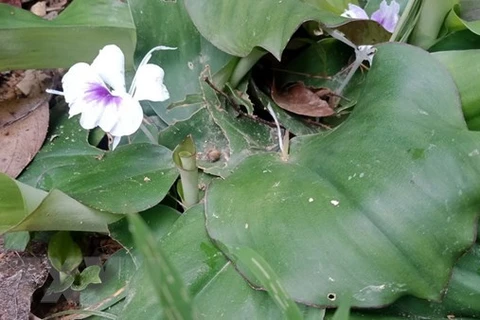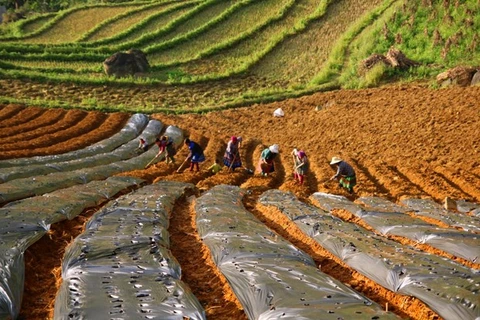Ninh Thuan (VNA) - The south-central province of Ninh Thuan plans to increase farming and exports of medicinal plants.
It has excellent conditions for growing various plants that have high medicinal and economic value, and so 1,269 kinds of medicinal herbs grow here.
They include 82 rare, precious and endemic kinds.
But they still grow mostly in the wild, and their cultivation and processing remain on a small scale according to the province People’s Committee.
There are few companies that invest in developing value chains for medicinal plant cultivation and processing, it said.
The province has drafted a plan for until 2025 to develop and conserve the medicinal plant gene pool under which 82 precious plants would be exploited sustainably.
It will also expand the cultivation of 25 others to meet market demand and grow 60 on a large scale for use in traditional medicines by the Cham ethnic people.
It will develop a medicinal plant growing area with one or two value chains comprising research, cultivation, processing and production of precious indigenous herbs.
The area will meet good agricultural and collection practices of the World Health Organisation (GACP-WHO) standards and use technology.
The province will continue to solicit investment in the processing of medicinal plants to make medicines, functional foods and cosmetics.
In the pipeline already are four projects to produce herbal medicines and functional foods in the Phuoc Nam Industrial Park in Thuan Nam district.
They include a 150 billion VND (6.4 million USD) plant to make medical and cosmetic products from neem and a 100 billion VND (4.3 million USD) plant to produce medicines, cosmetics and functional foods from aloe vera.
The other two are a plant costing 50 billion VND (2.1 million USD) to make functional foods from grapes, goats and sheep and a 50-hectare medicinal plant farm using high technology at a cost of 20 billion VND (850,000 USD) that will supply raw materials for medicines, cosmetics and functional foods.
Nguyen Long Bien, deputy chairman of the provincial People’s Committee, said investors in all sectors are encouraged to grow medicinal plants based on GACP-WHO standards.
The province would promote the export of medicinal plants and related products to strongly develop the sector, he said.
To achieve the targets, it has assigned relevant agencies including its Oriental Traditional Medicine Association to take measures like offering incentives and strengthening advocacy to increase awareness to exploit medicinal plants efficiently and discard harvesting methods that damage plants and lead to their possible extinction, he said.
It would encourage ethnic minorities to link up with companies to grow medicinal plants in combination with eco-tourism, he added./.
It has excellent conditions for growing various plants that have high medicinal and economic value, and so 1,269 kinds of medicinal herbs grow here.
They include 82 rare, precious and endemic kinds.
But they still grow mostly in the wild, and their cultivation and processing remain on a small scale according to the province People’s Committee.
There are few companies that invest in developing value chains for medicinal plant cultivation and processing, it said.
The province has drafted a plan for until 2025 to develop and conserve the medicinal plant gene pool under which 82 precious plants would be exploited sustainably.
It will also expand the cultivation of 25 others to meet market demand and grow 60 on a large scale for use in traditional medicines by the Cham ethnic people.
It will develop a medicinal plant growing area with one or two value chains comprising research, cultivation, processing and production of precious indigenous herbs.
The area will meet good agricultural and collection practices of the World Health Organisation (GACP-WHO) standards and use technology.
The province will continue to solicit investment in the processing of medicinal plants to make medicines, functional foods and cosmetics.
In the pipeline already are four projects to produce herbal medicines and functional foods in the Phuoc Nam Industrial Park in Thuan Nam district.
They include a 150 billion VND (6.4 million USD) plant to make medical and cosmetic products from neem and a 100 billion VND (4.3 million USD) plant to produce medicines, cosmetics and functional foods from aloe vera.
The other two are a plant costing 50 billion VND (2.1 million USD) to make functional foods from grapes, goats and sheep and a 50-hectare medicinal plant farm using high technology at a cost of 20 billion VND (850,000 USD) that will supply raw materials for medicines, cosmetics and functional foods.
Nguyen Long Bien, deputy chairman of the provincial People’s Committee, said investors in all sectors are encouraged to grow medicinal plants based on GACP-WHO standards.
The province would promote the export of medicinal plants and related products to strongly develop the sector, he said.
To achieve the targets, it has assigned relevant agencies including its Oriental Traditional Medicine Association to take measures like offering incentives and strengthening advocacy to increase awareness to exploit medicinal plants efficiently and discard harvesting methods that damage plants and lead to their possible extinction, he said.
It would encourage ethnic minorities to link up with companies to grow medicinal plants in combination with eco-tourism, he added./.
VNA























